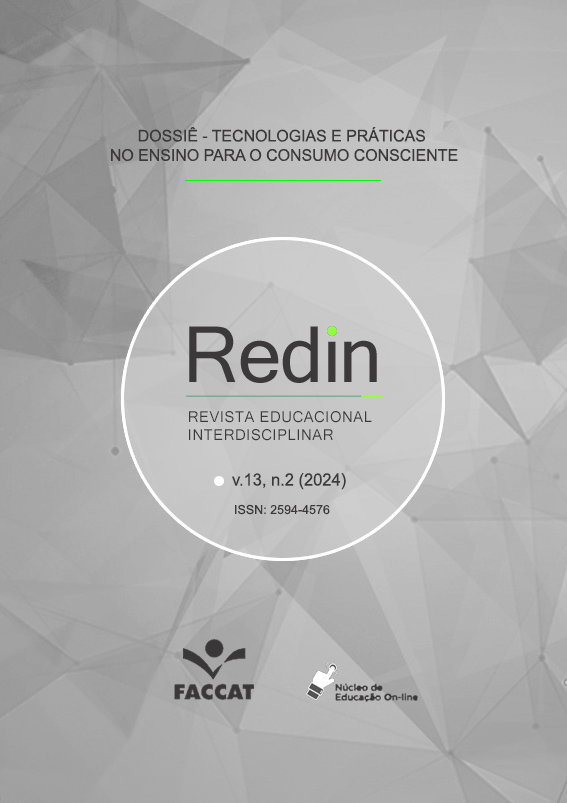High school student’s disinterest in school:
elements of the OnLIFE Education paradigm for understanding performance gaps in the Brazilian education system
Abstract
The global socio-ecological crisis, exacerbated by the challenges faced by vulnerable populations, is particularly pertinent in Brazil, a country marked by profound social inequalities, growing and significant episodes of climate change and a worrying educational reality. Here, we turn to secondary education, specifically thinking about school strategies that seek to raise awareness of sustainable and regenerative development and students' lack of interest in the school routine (Possa, 2018; 2023). This study adopts an interpretive research paradigm and uses Actor-Network Theory (Latour, 2005) as its main method, including methodologies such as case studies in the intermediate stages, focusing on the capitals of the Brazilian states, using interview techniques, questionnaires, focus groups, documentary analysis and content analysis. The research tries to answer how digital technologies figure in training practices aimed at Environmental Education in high schools in the 27 Brazilian State capitals. Results reveal a gap in teacher training to adopt educational strategies that integrate technologies in the OnLIFE education paradigm (Moreira; Schlemmer, 2020). Students' lack of interest in school routines is described here through six categories of analysis. In addition to expressions of dissatisfaction with the teaching model, generational mismatch and alleged lack of clarity about the purpose of certain curricular content, young people are demotivated, which hinders critical and emancipatory perspectives for social transformation and the improvement of life as a whole in the transition to digital culture and citizenship in the midst of the third industrial revolution (Rifkin, 2011).
Keywords: OnLIFE education; Third Industrial Revolution; High school; Conscious consuption; Sustainable development.
References
ACCOTO, C. Il mondo dato: Cinque brevi lezioni di filosofia digitale. Milão: EGEA, 2017.
BATESON, G. Mind and nature: a necessary unity. Cresskill: Hampton Press, 2002.
BOSTROM, N. Superintelligence: Paths, Dangers, Strategies. Oxford: Oxford University Press, 2014.
CASTELLS, M. A sociedade em rede. Tradução de Roneide Venâncio Majer. 9. ed. São Paulo: Paz e Terra, 1999.
CARSON, R. Primavera silenciosa. Tradução de José Paulo Paes. São Paulo: Editora Melhoramentos, 1969.
DE FÁTIMA FERREIRA, S. Evasão e Avaliação Escolar na Era da Educação Digital: Por uma Prática de Ensino Participativa e Integrada às Demandas Sociais. Editora Appris, 2020.
DI FELICE, M. Paisagens pós-urbanas: o fim da experiência urbana e as formas comunicativas do habitar. São Paulo: Annablume, 2009.
DI FELICE, M. Net-ativismo: da ação social para o ato conectivo. São Paulo: Paulus, 2017.
DI FELICE, M. La cittadinanza digitale: la crisi dell’idea occidentale di democrazia e la partecipazione nelle reti digitali. Milão: Meltemi, 2019.
DI FELICE, M. A cidadania digital: a crise da ideia ocidental de democracia e a participação nas redes digitais. São Paulo: Paulus, 2020.
DI FELICE, M. Depois do natural e do artificial: as hiperinteligências, os LLMs e as qualidades conectivas da episteme do terceiro milênio. Cadernos IHU Ideias, São Leopoldo: Unisinos, n. 348, 2023. Disponível em: https://www.ihu.unisinos.br/images/stories/cadernos/ideias/348cadernosihuideias.pdf. Acesso em: 9 de jan. 2024.
HUI, Y. Tecnodiversidade. São Paulo: Ubu Editora, 2021.
ILLICH, I. A Convivencialidade. Petrópolis: Vozes, 1973.
INSTITUTO BRASILEIRO DE GEOGRAFIA E ESTATÍSTICA – IBGE. Pesquisa Nacional por Amostra de Domicílios Contínua: resultados 2022. Rio de Janeiro: IBGE, 2022. Disponível em: https://painel.ibge.gov.br/pnadc/ . Acesso em: 11 de maio 2024.
JENKINS, H.; PURUSHOTMA, R.; WEIGEL, M.; CLINTON, K.; ROBISON, A. J. Confronting the Challenges of Participatory Culture: Media Education for the 21st Century. Cambridge, MA: MIT Press, 2009.
LATOUR, B. Reassembling the Social: An Introduction to Actor-Network-Theory. Oxford: Oxford University Press, 2005.
LOVELOCK, James E.; MARGULIS, Lynn. Atmospheric homeostasis by and for the biosphere: the Gaia hypothesis. Tellus, v. 26, n. 1-2, p. 2-10, 1974. Disponível em: https://www.tandfonline.com/doi/pdf/10.3402/tellusa.v26i1-2.9731. Acesso em: 12 de abr. 2019.
LOVELOCK, J. Gaia: um novo olhar sobre a vida na Terra. Lisboa: Edições 70, 1989.
MOREIRA, J.; SCHLEMMER, E. Por um novo conceito e paradigma de educação digital onlife. Revista UFG, v. 20, 2020. Disponível em: https://revistas.ufg.br/revistaufg/article/view/63438. Acesso em: 12 de mar. 2023.
MORIN, E. Os sete saberes necessários à educação do futuro. Tradução de Catarina Eleonora F. da Silva e Jeanne Sawaya. 2. ed. São Paulo: Cortez; Brasília: UNESCO, 2000.
INDICATORS, O. E. C. D. Education at a Glance 2022. Disponível em: http://meyda.education.gov.il/files/edu/data/eag2022.pdf . Acesso em: 15 de mar 2023.
RIFKIN, J. The third industrial revolution: how lateral power is transforming energy, the economy, and the world. New York: Palgrave Macmillan, 2011.
PEREIRA, D.H. et al. The alpha generation in the face of learning technologies: A geração alpha face às tecnologias de/na aprendizagem. Concilium, v. 24, n. 16, p. 534-555, 2024. Disponível em: https://www.clium.org/index.php/edicoes/article/view/3975. Acesso em: 10 out. 2024.
POSSA, A. D. Interação comunicacional de estudantes do ensino médio: netnografia para compreensão da nova ecologia cognitiva. 2018. Tese (Doutorado em Interfaces Sociais da Comunicação) - Escola de Comunicações e Artes, Universidade de São Paulo, São Paulo, 2018. doi:10.11606/T.27.2019.tde-17042019-152141. Acesso em: 12 jun. 2023.
POSSA, A. D.; COSTA, G. Futuro da educação: seleção de indicadores do PNE 2014-2024 e sugestões de aportes da perspectiva reticular para a próxima década. In: MAGALHÃES, Marina; DI FELICE, Massimo; FRANCO, Thiago (orgs.). Cidadania Digital: Conexão de todas as coisas. São Paulo: Alameda Editorial, [ano de publicação]. p. 333-358.
POSSA, A. D. Cyberbullying em ecologias conectivas escolares contemporâneas: abordagem interseccional em Santa Catarina. In: XVII Simposio Nacional da ABCiber, 2024, Florianópolis: aceito para publicação.
SILVA, T.; RAMOS, I. Nativos digitais: será? A falsa interpretação que leva à exclusão digital na educação brasileira. Journal of Broadcasting & Electronic Media, v. 58, n. 3, p. 318-334, 2014.
SINISGALLI, P.; JACOBI, P. A ciência e os temas emergentes em ambiente e sociedade. A ciência e os temas emergentes em ambiente e sociedade. IEE/USP. São Paulo: IEE/USP/PROCAM, 2020.
TOFFLER, A. A terceira onda. Tradução de João Távora. Rio de Janeiro: Record, 1980.
UNESCO. Media and Information Literacy: Policy and Strategy Guidelines. Paris: UNESCO, 2013. Disponível em: https://unesdoc.unesco.org/ark:/48223/pf0000225606. Acesso em: 10 set. 2022.
Downloads
Published
Versions
- 2025-02-14 (2)
- 2024-12-23 (1)


